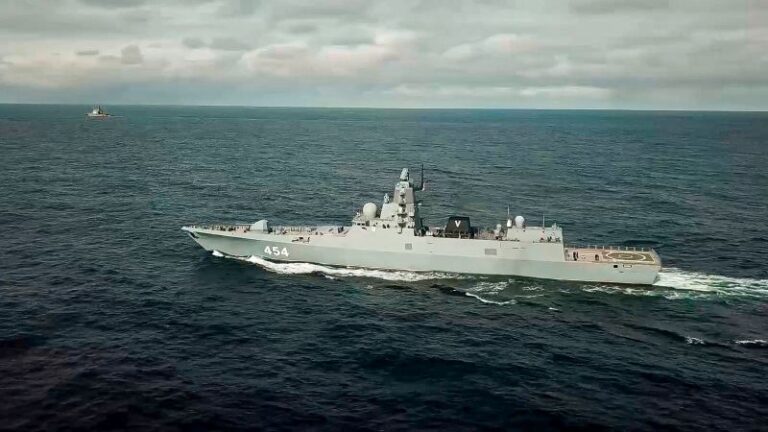Russian Defense Ministry Press Office/AP
The photo was taken from a video released by the Russian Defense Ministry Press Service on May 23, 2024, showing the Russian frigate Admiral Gorshkov conducting air defense drills in the Atlantic Ocean.
Havana, Cuba
CNN
—
The Cuban government announced on Thursday that a flotilla of Russian naval vessels, including a nuclear submarine, will visit Cuba next week as part of “historic friendly relations.”
According to a statement released by the Cuban Revolutionary Armed Forces through its Ministry of Foreign Affairs, the Russian “frigate Gorshkov, nuclear submarine Kazan, fleet oil tanker Pasin and rescue tugboat Nikolai Chikel” are scheduled to visit Havana port between June 12 and 17.
Cuba maintains that none of the ships are carrying nuclear weapons and that their visits pose no threat to the region.
“Visits of naval forces of other countries are a historical practice of the revolutionary government with countries with which it maintains friendly and cooperative relations,” the statement added.
Moscow has not confirmed the information provided by Cuba. CNN has reached out to the Russian government for comment.
This is not the first time Russian naval vessels have been sent to Cuba, which was a key ally of the Soviet Union during the Cold War and briefly stationed nuclear missiles there at Moscow’s request during the 1962 Cuban Missile Crisis.
Last July, the Russian Navy training ship Perekop arrived in Havana for a four-day visit.
The visit is believed to be the largest in recent years.
Communist Cuba has become increasingly reliant on Russian oil and aid as it weathers its worst economic crisis in decades.
Cuba’s announcement came days after U.S. President Joe Biden gave Ukraine permission to launch limited attacks on Russian territory using U.S.-made weapons, prompting Russian President Vladimir Putin to say it is “always bad for Western countries to supply weapons to conflict zones.”
“Finally, if we find that these countries are drawn into a war with us, and their actions directly contribute to a war with the Russian Federation, we will reserve the right to take similar action,” Putin said on Wednesday.
Putin added that in response, “we will improve our air defense systems to destroy the missiles,” and questioned whether “Russia has no right to supply such weapons” to parts of the world where they would strike sensitive facilities in countries that are attacking Russia.
The Russian military is expected to step up naval and air activity near U.S. waters this summer as part of routine training leading up to global naval exercises in the fall, according to the State Department and Department of Defense.
“Russia may deploy naval combat vessels to the Caribbean and potentially make port calls in Cuba or Venezuela,” Pentagon spokesman Maj. Charlie Dietz said Thursday. “We also expect aircraft deployments and flights in the region. These deployments would be part of routine Russian naval operations and do not pose a direct threat to the United States.”
Dietz said that in addition to the Russian ships, the Russian Navy’s Severodvinsk II-class submarine is also scheduled to visit this summer. Approval for the submarine’s visit was “at least in part due to Havana’s discomfort” with a visit last year by a U.S. nuclear submarine to Cuba’s Guantanamo Bay naval base, Dietz said.
Dietz said Cuba had hosted Russian ships every year from 2013 to 2020, adding that the exercises “impose a huge burden on the Russian Navy, which faces the challenges of maintaining readiness and conducting deployments with an aging fleet.”
“Given Russia’s long history of port calls in Cuba, this is viewed as a routine naval visit, especially in the context of increased U.S. support for Ukraine and NATO exercises,” Dietz said.

